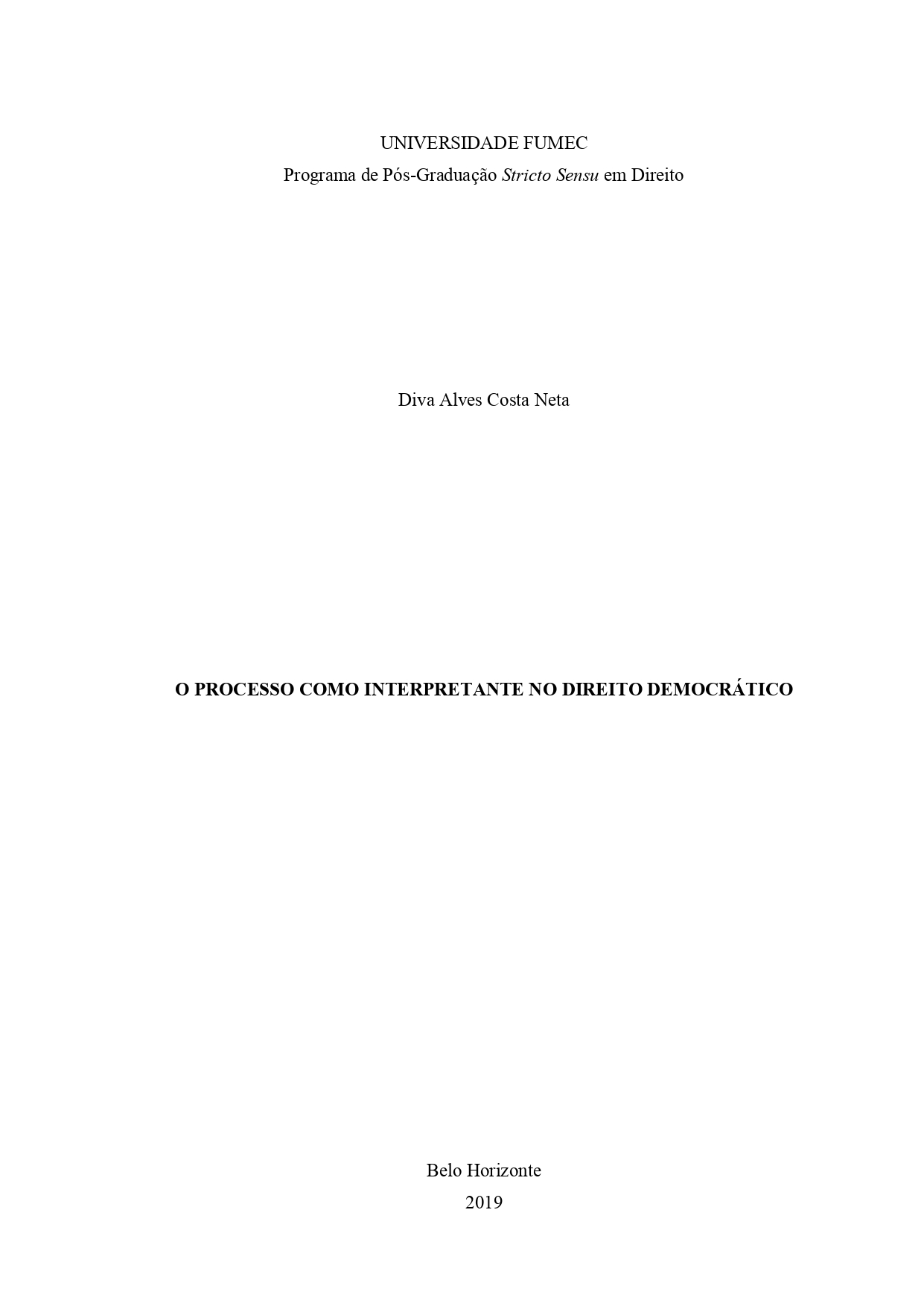O processo como interpretante no direito democrático

Visualizar/
Data
2019Autor
Costa Neta, Diva Alves
xmlui.mirage2.itemSummaryView.MetaData
Mostrar registro completoResumo
A linguagem é o meio pelo qual se dá a comunicação e é por intermédio dela que as normas
são formalizadas e interpretadas. Faz-se necessário, portanto, entender como e por que as
mensagens são transmitidas e, mais ainda, compreender como ocorre a produção e a
interpretação do discurso normativo e se essas ações estão adequadas a um Estado de Direito
democrático. É preciso, então, problematizar a interpretação e o papel do interpretante, a fim
de questionar quem faz a interpretação no âmbito do Direito e dar início a uma reflexão de
como essa interpretação deveria acontecer dentro do Estado Democrático de Direito. Dessa
forma, questiona-se: quais os critérios de interpretação da decisão jurídica? Como controlar as
possíveis interpretações advindas do discurso jurídico? Quais crenças se escondem por trás do
modo de interpretação apoiado em um Direito dogmático? A partir dessas indagações, o
presente trabalho apresenta, primeiramente, a teoria do interpretante, abordando os principais
conceitos de Semiótica, Semiologia e Linguística e os três postulados epistemológicos da
teoria semântica, utilizados como ponto de partida dessa teoria e que trata da dialética
estabelecida entre discurso e texto para, então, apresentar a teoria neoinstitucionalista do
processo, como aquela que quebra a corrente doutrinária que ainda deposita sobre o intérprete
o poder da interpretação, mantendo uma crença no saber do juiz sem eleger uma teoria que
sirva de marco de controle do pensamento. Esta dissertação pretendeu traçar uma relação
entre Linguística e Direito, investigando como a teoria neoinstitucionalista do processo pôde
assimilar os estudos desenvolvidos na teoria do interpretante e sanar alguns pontos de forma
que possam contribuir para uma aplicação democrática do Direito. Demonstrando, assim, a
importância da demarcação teórica da linguagem jurídica no nível instituinte legiferativo.
Para tanto, valeu-se de pesquisa bibliográfica em perspectiva interdisciplinar, tomando como
base a teoria neoinstitucionalista do processo, principalmente naquilo em que ela se aproxima
da teoria do interpretante de Edward Lopes e da teoria de Karl Popper, como referencial
teórico, com método de abordagem predominantemente hipotético-dedutivo. Language is the means of communication through which legal rules are created and
interpreted. Thus, how and why messages are transmitted must be investigated, as well as
how the production and interpretation of the normative discourse is carried out, and if these
actions are adequate for a democratic state that abides by the rule of law. The interpretation
and the role of the interpreter must be considered so as to question who makes the
interpretation in the aspect of the Law, together with a reflection on how such interpretation is
to be carried out in a democratic state that abides by the rule of law. The following issues are
challenged: what are the criteria for interpreting a ruling? How the possible interpretations
stemming from the legal discourse are to be controlled? Which beliefs are hiding behind the
interpretation mode supported by a dogmatic Law? Based on these questions, this study
presents the interpreter theory, approaching the main concepts in Semiotics, Semiology and
Linguistics, coupled with the three epistemological postulates of the semantic theory. These
concepts and postulates function as a foundation of this theory, focusing on the dialectic
established between discourse and text; after that, the neoinstitutionalist process theory as the
one that breaks the doctrine chain that still grants the interpreter with the power of
interpretation. This leads the interpreter to believe the Judge’s knowledge without establishing
a theory that will function as a tool through which to establish control. This dissertation aims
to establish a link between Linguistics and Law, investigating how the neoinstitutionalist
process theory could encompass the studies carried out on the interpreter theory, and solve
some issues in order to contribute to a democratic use of the Law. Finally, this demonstrates
the importance of establishing limits to a legal language concerning the legislators. To
achieve this, a bibliographic research was carried out from a transdisciplinary perspective,
based on how the neoinstitutionalist process theory, especially as to how close it is to Edward
Lopes’s theory of the interpreter and Karl Popper’s theory in terms of theoretical references.
A predominantly hypothetical-deductive approach was used.
